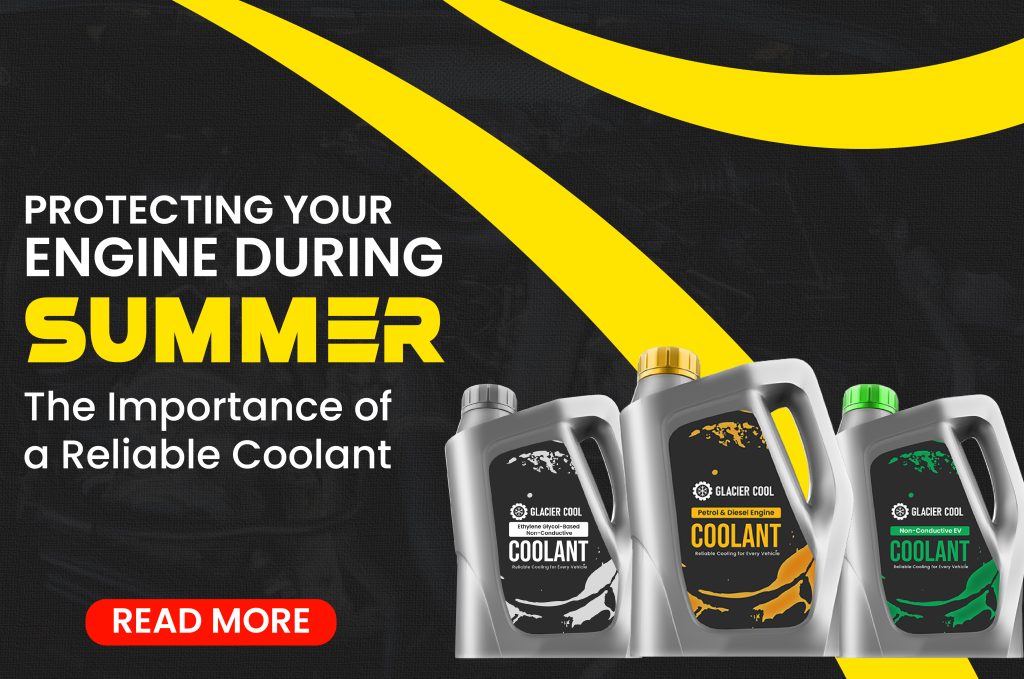High summer temperatures force the vehicle engine to perform additional work to maintain its coolness. The incorrect coolant use will lead engines to overheat while causing damage to internal components and resulting in roadway breakdowns. A dependable coolant operates as both a temperature regulator for engines and defends crucial vehicle components against heat-related deterioration and usage. The functionality of your vehicle depends heavily on coolant because it affects both engine condition and performance besides warning light prevention. Learning about coolant function in hot weather prevention with coolant automotive will preserve vehicle efficiency and minimize expenses on maintenance throughout the summer seasons.
Why Does Coolant Matter more in summer?
Excessive summer heat places additional stress on engine components most particularly when you find yourself stuck in traffic or performing extended journeys. Insufficient coolant combined with old or unclean coolant poses a serious risk that engines will overheat. The lack of proper coolant causes harm to components including radiator assemblies as well as gaskets and pistons. Your engine stays comfortable in all conditions thanks to reliable coolant which effectively manages temperature increases that occur when the outside weather gets hot.
Coolant Helps Prevent Engine Damage
The functioning of an engine results in major heat generation. The lack of proper engine cooling lets heat expand parts which causes deterioration and breaks. Accumulation of coolant safeguards metal components through its ability to stop water from contending with various materials. The modern coolant formulas include protective chemicals that defend different engine elements including radiators water pumps and thermostats. Your automobile will operate with better efficiency while experiencing fewer maintenance problems because of the protective effects that coolant provides for engine cooling. The engine receives internal protection through the shield-like performance of coolant.
Reliable Coolant Supports Fuel Efficiency
Engines work best at certain temperatures. The engine performance becomes inefficient when its temperature operation deviates from the optimal range. The coolant automotive aids in maintaining proper engine temperature through which all components operate optimally. Your engine gets better fuel efficiency coupled with reduced motor strain when your vehicle operates within its optimal temperature range. Keep your coolant in good condition because it saves money on gasoline expenses while minimizing your engine wear over time.
What Signs Show That My Car Requires Additional Coolant?
The process of checking coolant remains straightforward despite its simplicity. The coolant reservoir in most cars remains clear to view while displaying maximum and minimum level indicators. Refilling is necessary whenever the minimum marker crosses the current fluid position. A coolant’s healthy condition can be confirmed by examining its color which should appear as either green red yellow or blue while being clear and bright.
Conclusion
A suitable coolant provides your engine protection alongside efficiency and temperature control during hot summer seasons. A simple coolant maintenance schedule enables engine safety through decreased heat and protects your vehicle from breakdowns during critical usage periods. The maintenance process for vehicles includes this basic step which strengthens key attributes of both engine operation and vehicle durability. During summer drives both in the city and on the highway, you will need reliable coolant to protect your engine’s operation. Select Glacier Cool as your engine coolant because it represents the best combination of performance and dependable protection for your engine system.



